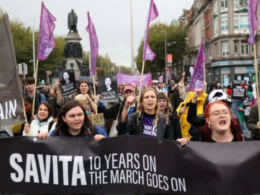The new Conservative – Liberal Democrat government in Britain has launched the most savage programme of cuts of any government in decades.
In his emergency budget speech on 22 June Chancellor George Osborne described the cuts he was delivering as “ensuring everyone, across the income scale makes a contribution to helping our country reduce its debts”. This claim is a lie. The cuts fall hardest on the poorest and the young, and deliberately so. The ideology of this government dictates that the working class should pay for the crisis of the system.
The emergency budget was only one in a series of announcements of cuts in the last number of months. The Comprehensive Spending Review in the autumn will result in even more cuts, with some departments facing the prospect of up 40% less to spend.
The result of the budget will be that the real incomes of working people will fall over the next few years-perhaps by up to 10% over the next three years (depending on inflation).
For many a much sharper reduction in income looms as they will lose their jobs: the Office for Budget Responsibility estimates that the budget will lead directly to 600,000 job losses in the public sector and 700,000 job losses in the private sector as a knock-on effect.
VAT, a tax which hits the working class hardest, will rise from 17.5% to 20% in January 2011. The pay of most public sector workers has been frozen for two years.
Child benefit has been frozen for three years. In addition from April 2011 pregnant women will no longer get the “Health in Pregnancy” payment of £190 and the “Sure Start” maternity grant of £500 will only be for the first child, not any subsequent children. The “baby element” of child tax credits, which was an additional payment worth about £10 a week for a year, has also been abolished.
The maximum income at which a household can get “tax credits” has been reduced from £50,000 a year before tax to £40,000 from April 2011 and will be reduced to £30,000 by 2012. This cap will affect many ordinary couples, who work full time and earn average wages, but who face steep nursery costs. Benefits and tax credits will no longer be up-rated by the retail price index, one measure of inflation, but instead by the alternative measure, the consumer price index, shaving about 1% a year from payments.
The government recognises that domestic demand will be weak because workers will lack the money to buy goods and hopes that the economy will grow as exports expand. As commentator Larry Elliot puts it however: “The Germans, the Greeks, the Irish and the Spanish – not to mention Japan, the US and the fast growing emerging nations of China – all see their economic future in the same way. Just how every country in the world can enjoy export-led growth has not yet been explained.” (The Guardian 28 June 2010)
The risk is not just of economic stagnation but of a new recession. The economist Paul Krugman has warned of the risk of tipping the world into a Great Depression the price for which would be paid by “tens of millions of unemployed workers, many of whom will go jobless for years, and some will never work again.” (The Guardian 29 June2010).
Northern Ireland is heavily dependent on public spending and will be especially badly hit in the next period. £128 million is to go now from the Northern Ireland budget and perhaps £1 billion will be cut over the next five years. The cuts are already falling heavily and resistance has begun. A spirited local campaign was initiated when the Mid-Ulster Hospital casualty department was closed and parents and trade unionists worked together when cuts were made to summer schemes for children with disabilities in June. These campaigns are an indication of the anger, and fear, of working people. The sheer scale of the onslaught may have a stunning effect, leading to a “get your head down” approach amongst some workers, but it is more likely that there will be local opposition and this may spark a more widespread and generalised fight back.
Bob Crow, General Secretary of the RMT transport union recognizes this and has called for a “sustained campaign of generalised strikes across both the public and private sectors and community direct action to defend public services.” Mark Serwotka, General Secretary of the PCS, has called for “joint union action and campaigning in communities” to stop the cuts. Crow has also argued for “the trade unions to form alliances with community groups, campaigns and pensioners’ organisations in the biggest show of united resistance since the success of the anti-poll tax movement.”
A mass national demonstration against the attacks of the Con-Dem government is a necessary and urgent first step. Properly built for, such a demonstration would express the opposition of millions to the attacks. It would build confidence in struggle and prepare the way for a 24-hour public sector strike.












